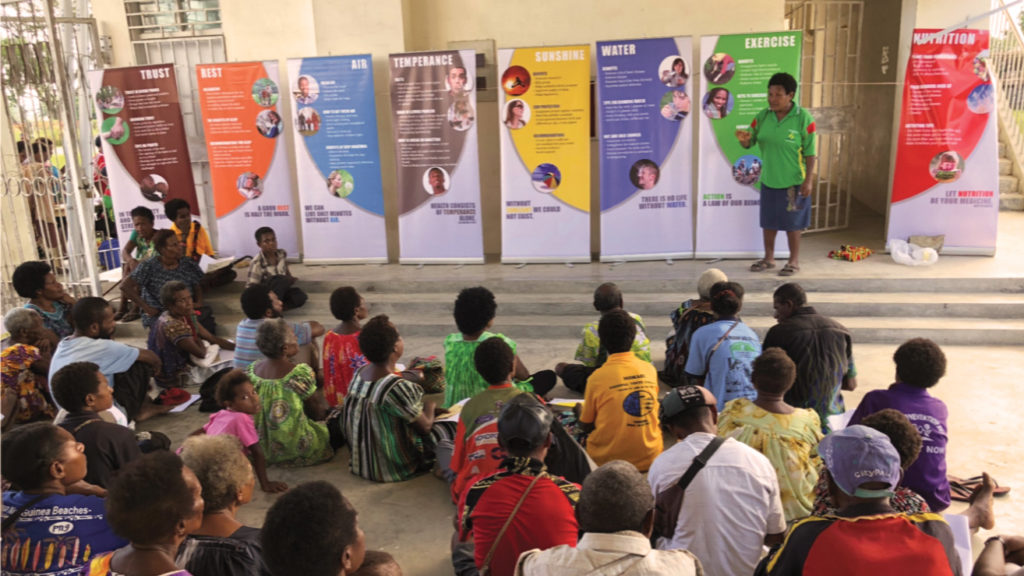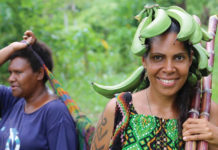Q: Dr Chester, when missionary doctors first visited remote villages in the South Pacific, what health problems did they find?
a: The health problems our early missionary doctors found were mostly infectious or communicable diseases; respiratory diseases such as pneumonia in both children and adults. By this time infectious diseases such as tuberculosis and typhoid fever had been introduced and became major problems. Diarrheal diseases and skin diseases were rampant due to ignorance on the principles of both hand-washing and personal hygiene.
Q: Now that modern medicine has arrived in much of the Pacific, are we seeing less problems with infectious diseases?
a: Yes. Nowadays infectious diseases are not as common. We are witnessing a significant reduction in infectious or communicable diseases such as leprosy, malaria and tuberculosis.
Q: But in our history, wasn’t it also the case that while Captain Cook’s sailors, for example, suffered from serious diseases like scurvy, syphilis and smallpox, the Pacific peoples they encountered were healthier in many ways?
a:The people of the Pacific had some advantages because they lived mainly on plant foods, mostly high-fibre carbohydrates such as wild taro, yams and later sweet potato and cassava. Leafy vegetables and fruits constituted an important part of their diet—pawpaw, coconut and other locally grown fruits. Our Pacific people back in those early days lived a very active lifestyle. They worked in their garden most days. Walking was their main mode of transport. They never stopped walking, chopping, paddling, digging, fishing—and living.
Q: Looking across the Pacific today, it seems there’s a wide variation in health outcomes. Places like Nauru, Cook Islands and Fiji are among the world’s most obese nations, for example, but in PNG or Solomon Islands it seems there are very few obese people. What makes the difference?
a: Genetics may play a part in body size, but Melanesians appear to be somewhat more active, particularly those living in the rural areas. Poverty may play a part in this scenario. But, having said that, obesity is becoming a major issue in the Melanesian population. In Solomon Islands, for example, 30 per cent of the female population are overweight or obese and similar trends are observed in Vanuatu and Fiji.
While the typical diet in rural Melanesia is still somewhat plant-based, the introduction of highly processed foods such as white rice, noodles, soda drinks, corned beef and sausages is making major inroads like we’ve never seen before. The result is some major health issues. It would be true to say that the prevalence rates of diabetes, for example, may not be too different in rural Melanesia compared with urban Melanesia. The majority of diabetic patients in these countries come from rural areas. Non-communicable diseases now account for approximately 70–75 per cent of the disease burden in and across Melanesia, indicating that obesity is not the only risk factor for lifestyle disease. Other risk factors such as an unhealthy diet, smoking and alcohol use should be taken into account.
Q: Most people in the Pacific respect the Holy Bible. Do our Scriptures give us any guidelines for better health?
a: Approximately 90 per cent of the Pacific population are Christians so the sad reality is that the majority of people who die from lifestyle disease here are Christians. Here is a concern—overeating, or “gluttony” as the Bible phrases it, has long been a major issue in the Pacific. While most religions encourage us to avoid damaging behaviours such as drinking and smoking, overeating is usually not considered a great sin.
There are wonderful counsels in God’s Word on health, diet and lifestyle that, if adopted, can help to prevent many people succumbing to lifestyle disease. Some examples:
- Genesis 1:29 focuses on the original diet in the garden of Eden. Scientific studies have clearly shown that plant foods can help prevent disease and even reverse lifestyle disease.
- 1 Corinthians 3:16,17 says that our body is the temple of the Holy Spirit. Therefore, it is important that we take good care of it in every way.
- 1 Corinthians 10:31: “So eat and drink and do everything else for the glory of God.” True Christianity will impact every aspect of our lives, including our diet.
- Galatians 5:23 mentions temperance or self-control as one of the fruits of the Holy Spirit, a principle that relates well to health, wellbeing and longevity.

Q: How can church communities help their members embrace these biblical health principles?
a: Every local church should be encouraged to be a centre of health influence within its community, and every member a health promoter. This means that we are not only preaching health and giving advice to people on health principles, but that we ourselves are living those very principles.
We must include health in the life of our churches. One way this can be done is comprehensively integrating health into the various departments within the local church. For example:
- Children’s Ministry—Children should be taught simple health and hygiene principles, including hand-washing, avoiding unhealthy packaged foods and enjoying fresh fruit and vegetables.
- Women’s Ministry—Women can meet to teach one another principles of good nutrition, to share ideas of simple, healthy and affordable family meals, and to enjoy physical exercise together.
- Youth Ministry—Team sports and training are great ways to stay healthy. Young people can encourage one another to make wise lifestyle choices as they enter adulthood. They can also share health information with their friends via cell phone and participate in health awareness campaigns.
- Family Ministry—Parents should be taught to bring up their children with a healthy lifestyle. To prepare and eat balanced plant-based meals together, to work in the garden together, and to play active games together. The children will learn more if what mama and daddy do matches what they say.
Our churches need to invest time and resources into organising health programs to help their members as well as the wider community. Programs provided by various Seventh-day Adventist churches, for example, are the Addiction Recovery program, stop-smoking programs and the Complete Health Improvement Program (CHIP).
Q: What about governments? Surely they should have a role in building health awareness?
a: The governments of the Pacific are now seriously looking at ways to combat lifestyle disease through policies and tax. Most countries have set high tax rates on cigarettes and alcohol. Some countries like Solomon Islands are seriously considering increasing tax on white rice, noodles, soda drinks and other similar commodities.
Q: You’re a doctor, so please, give us a prescription to improve our health.
a: My prescription includes:
- Eat healthy food—Healthy nutrition is absolutely crucial to enjoying good health. I strongly promote a plant-based diet.
- Regular physical activity—Daily exercise helps protect us from many diseases by strengthening our body’s immunity—its God-given ability to fight off sickness. Exercise also helps us maintain a healthy body weight, strengthens our bones and improves our mood.
- Drink fresh water—it promotes good health. Avoid sugary drinks or caffeinated beverages.
- Moderation in diet is a great principle for good health and longevity. Avoid habits that can be detrimental to health such as cigarette smoking, alcohol consumption and drug use.
- Fresh air is great for good health so spend time outdoors and enjoy the sunshine and fresh air.
- Rest is crucial for good health. Seven-to-eight hours of sleep at night is what the body needs to recuperate and repair itself for another day.
- God is the best Friend to have. Trusting in God helps us go through life with confidence.
Dr Chester Kuma has worked as a surgeon and health administrator in his home country of Solomon Islands. Now based in Sydney, he leads the Seventh-day Adventist Church’s health ministry for the South Pacific region.







